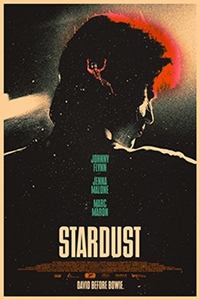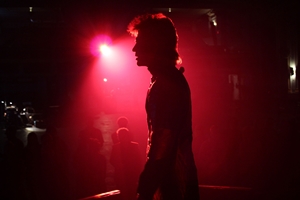Canada: Friday, November 27, 2020
IFC Films
David Bowie is one of the most seminal legends in music history; but who was the man behind the many faces? In 1971, a 24-year-old fledgling David Bowie (Johnny Flynn) is sent to America to promote his newest record, The Man Who Sold the World. Leaving behind his pregnant wife Angie (Jena Malone), Bowie and his band embark on a makeshift coast-to-coast promotional tour with struggling Mercury Records publicist Rob Oberman (Marc Maron). Stateside, Bowie is quickly met with an audience that's not yet ready for him. During the tumultuous journey, Bowie slowly begins to realize a need to reinvent himself in order to truly become himself; it's with that realization that his iconic, celestial alter-ego Ziggy Stardust is born. Anchored by two stellar performances from Flynn and Maron, Stardust offers an intimate glimpse into the moments that inspired the creation of Bowie's first and most memorable alter-ego, illuminating the turning point that cemented his legacy as one of the world's greatest cultural icons.
Cast & Crew
Movie Cast
Movie Crew
User Reviews
Public Reviews - 1 Reviews
-
Gregory M. - Rated it 3 out of 5
"Stardust" Meet David before Bowie. One of the greatest icons in music history. But who was the young man behind the many faces? In 1971, a 24-year-old David Bowie (Johnny Flynn) embarks on his first road trip to America with 'Mercury Records' publicist Ron Oberman (Marc Maron), only to be met with a world not yet ready for him. "Stardust" offers a glimpse behind the curtain of the moments that inspired the creation of Bowie’s first and most memorable alter ego, 'Ziggy Stardust', capturing the turning point that cemented his career as one of the world’s greatest cultural icons. At the time the film is set in 1971, David Bowie is performing a lot of covers, including work by 'The Velvet Underground', 'Jacques Brel', 'Cream', 'The Who' and 'The Yardbirds'. In the film he performs work by 'Brel' and 'The Yardbirds', as well as 'Good Ol Jane'. The script centers on a particular moment in David’s life, as a young artist starting out before he’s really famous, before 'The Ziggy Stardust' years. That's always a really interesting time in Bowie’s life because he's trying really hard and kind of failing a lot. Looking at that point in somebody’s life who goes on to become such an iconic voice and personality in our times. As an artist who influences so many people, where's he before that moment when he brakes through? It’s really clever the way the story focuses on a few months in his life, on his trip to America, which is so important to him. It’s where you see him gather the references and influences that go into 'Ziggy Stardust' that's basically his breakthrough moment as an artist. The David Bowie who arrives in America for the first time in January 1971 is not a star. He's an ambitious but insecure young man, with just one hit under his belt that most of the music business had dismissed as a novelty record. And he also has a deep fear that he would soon suffer the same fate as the man who practically raised him; his half-brother, Terry Burns (Derek Moran). Born ten years before David, Terry gives his younger brother a musical education, takes him to his first ever gig, buy him his first record. David’s maternal aunts and grandmother had all suffered bouts of mental illness and in 1967, when David was just 20, Terry had a complete mental breakdown and was sent to an asylum. David’s fear that he too could be struck down by schizophrenia is very present on 'The Man Who Sold the World'. Singing about his fractured inner life probably helps him to stay in one piece. But it didn’t bring him the fame and recognition he craved. Very little has been written about that first trip he made to America. In some respects, it's a disaster, without a visa or musician’s union paperwork, he couldn’t even perform the songs he's there to promote. But instead he finds some of the ideas and influences that he would meld together to create his alter ego, 'Ziggy Stardust'. Ziggy is the culmination of David’s struggle to experience madness in a safe way. It's a means to develop multiple personalities without becoming a case of multiple personality disorder. It converts the potential delusion that he's to be a world famous rock star into a reality. But above all, it's born out of his family dynamic. The film is very much grounded in fact; but it’s also a work of speculative fiction. The film has a slightly heightened, playful tone, but it's true to the spirit of where David is at around that point in his life. Finding a musician who could connect with that experience of an artist starting out, figuring out his identity as a performer, is far more important than physical resemblance. To be a young guy in America, before the Internet and before that sort of constant commercial integration between 'European' culture and 'American' culture, it's such a separate universe. America is huge. The steam coming up from the subway and the yellow taxis. It’s just so intense. The first time you travel so far from home is so exciting and inspiring and that’s what we’re telling in this story. For David to go to America at this time, in 1971, when it’s even more American, not cross-pollinated with any other culture, is just so staunchly American. This is the era of 'The Vietnam War' and it’s an interesting time when Americans have just been through social change at the end of the '60s'. It’s probably quite a divided country where there’s a lot of what still looks like the '50s'. David goes there and he sees diner culture and all that, and he walks up wearing a dress. He goes to 'The Factory' and meet Andy Warhol; all these massive American cultural references kind of just seeps into him. He mixes 'French' chanson with 'American' garage rock. He really put on a character and slowly reinvents himself over the years. He's a sponge for different musical styles. There are pictures of him at these parties playing little sets in a dress and long hair, which the film replicates. It becomes something completely new and exciting through his own interpretation. How can you play Bowie in a sensitive way that doesn’t betray his legacy and him as an artist?” David Bowie had many different faces and almost looked completely different at various stages throughout his life. There probably are great David Bowie impersonators but that’s not what it’s about. Regardless of whether it’s David Bowie or not, it has to be a truthful character. It's a pretty real set of circumstances that we know he went through, so it feels good. It flows really beautifully and the relationships that are portrayed provide a kind of dynamism and intention. It's a film about what makes someone become an artist; what actually drives them to make their art. That someone is David Bowie, a man we’re used to thinking about as the star he became, or as one of his alter egos; 'Ziggy Stardust'; 'Aladdin Zane'; 'The Thin White Duke'. Someone we only ever saw at a great distance, behind a mask; a godlike, alien presence. Even in his perfectly choreographed death, he didn’t seem like a regular human being. Rather than make a biopic, or a spin through his greatest hits, the idea is a film about what we’ve not seen; the interior journey David Bowie might have taken to become that artist. We've been fascinated by Bowie ever since we'rema kid. We bought every record, read every interview, every biography. What surprised us is how little most people seemed to know about his family background, about his life before that first real flush of fame. Besides music from the period, the soundtrack also includes work from contemporaries like 'Marika Hackman' and 'The Wave Pictures', who are all life-long Bowie fans. written by Gregory Mann




